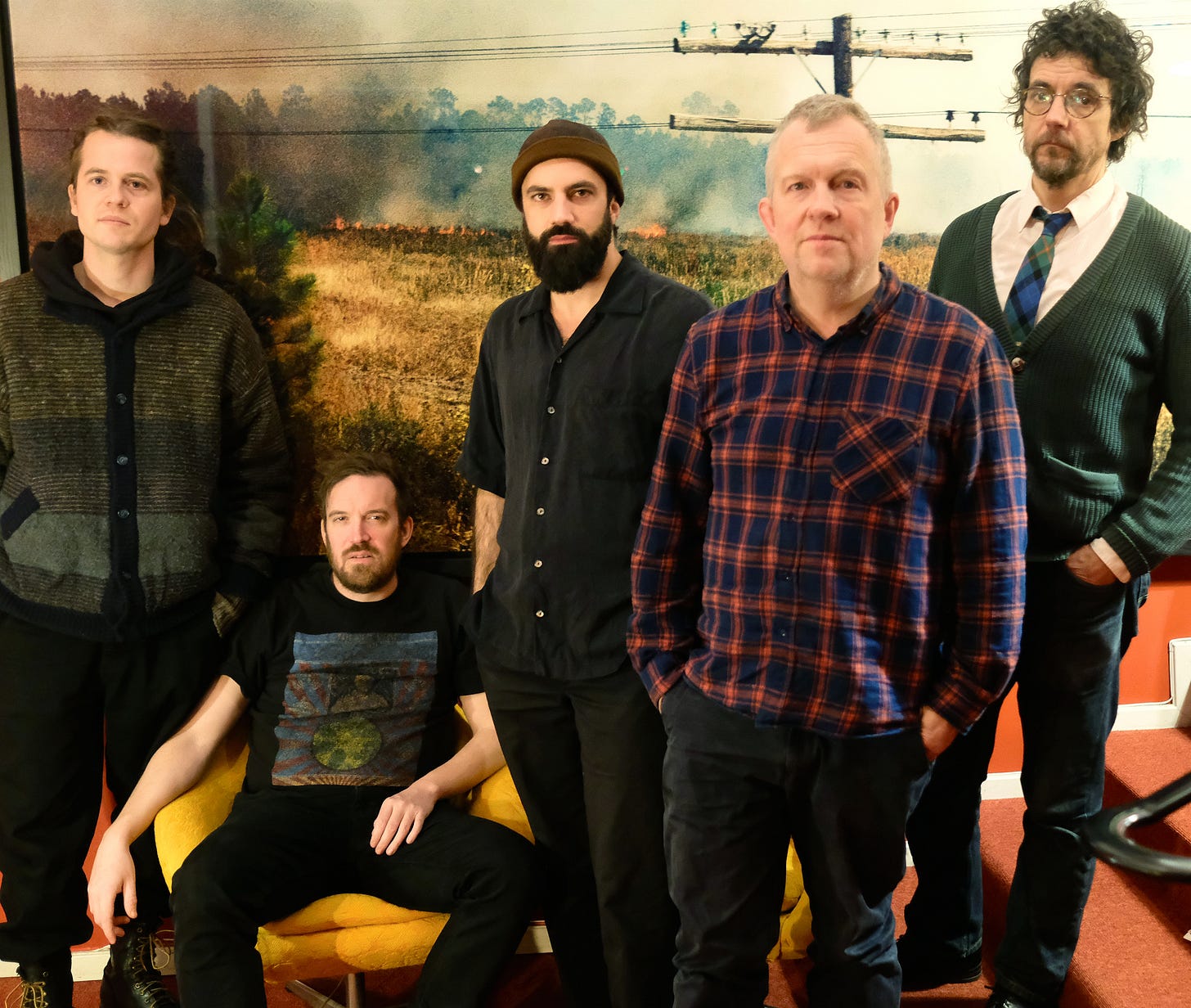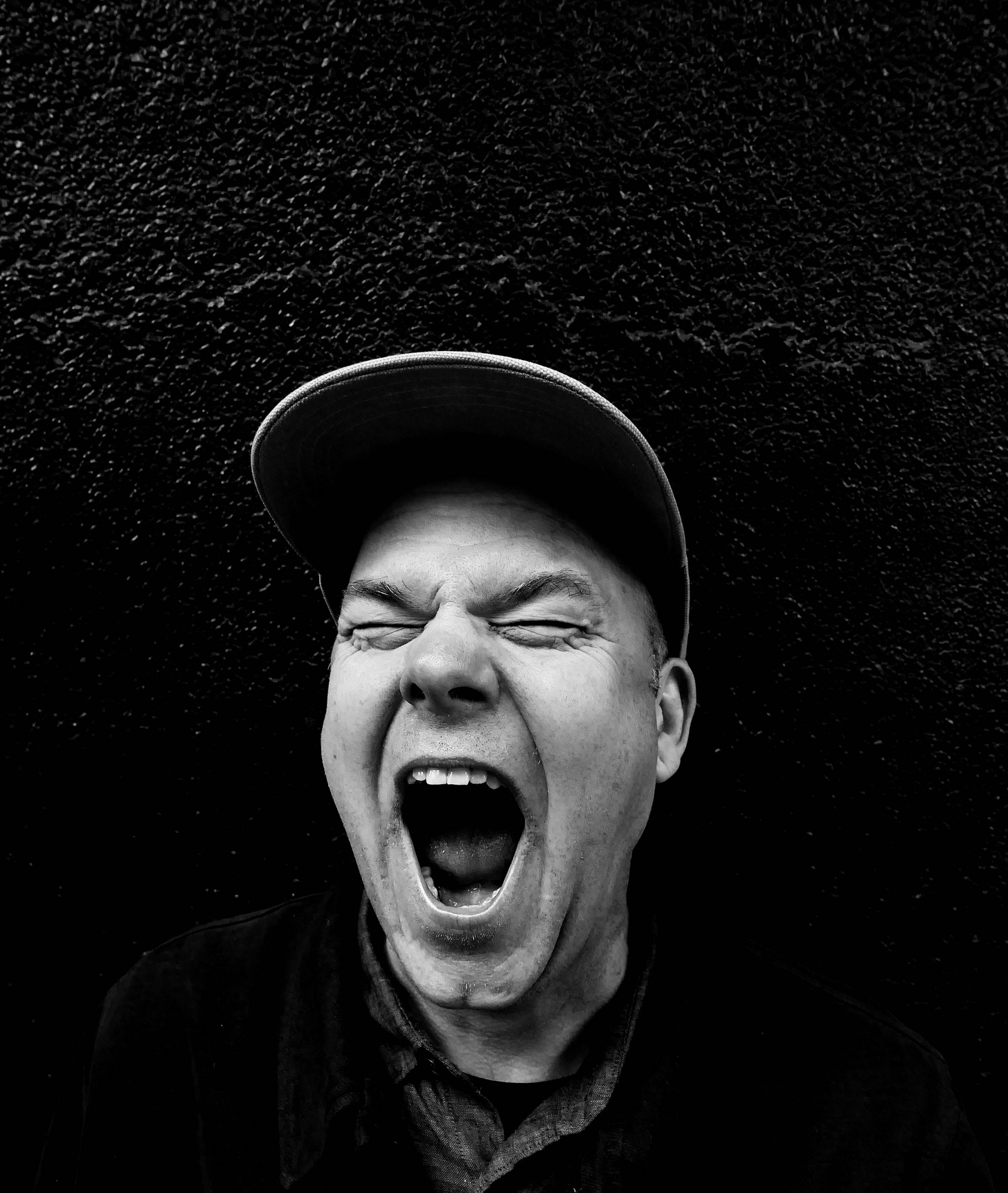David Grubbs Leans In to Dark Days
David Grubbs spent last fall as a fellow at the American Academy in Berlin, a visit that produced numerous opportunities to hear his thoughts and music. But I think being affected by his unbridled positivity and enthusiasm might’ve been the best thing about his stay. Grubbs is a serious thinker and he’s no Pollyanna, but I saw an artist who realized that making work is one of the strongest antidotes to a world in crisis. I also witnessed a person who dared to make the most of his opportunity, attacking every artistic encounter with unalloyed excitement and curiosity. It was inspiring.
I can’t help but be reminded of his attitude when listening to his superb new album Whistle From Above (Drag City), a byproduct of his post-Covid life where he spent hours woodshedding, and, in his words, playing “a shit-ton of guitar.” In his recent visits it’s been clear that this is no exaggeration, and the concerts I’ve caught by him over the last year or two have featured some of his most inspired playing. Last fall he released If a Body Meet a Body (Shimmy-Disc), his guitar-centric trio with Wendy Eisenberg and Kramer, which reinforced his penchant for collaboration, surrendering some of his own sonic trademarks in favor of an ensemble approach, but this new collection crackles with some of Grubbs’ most identifiable quirks—the hanging, opening chord of “The Snake and Its Tail” and the way a probing, highly characteristic lick soon emerges, buffeted by the drumming of Andrea Belfi and the rugged tunefulness of trumpeter Nate Wooley, or the plangent piano playing that dominates the beautifully moody “Hung in the Sky of the Mind” with harpist Rhodri Davies. Most of the tracks are duos (with a couple of trios) recorded at home in New York and abroad, loosely composed themes spiked by fortifying improvisation. Over and over an elegant introduction is either splayed open or it takes on new meaning when a second voice enters. The title track features a beautiful sequence of resonant chords electrified by the harmonies of Cleek Schrey’s ten-string violin, which sometimes sounds more like a harmonium or a whistle than a fiddle.
Across the album Grubbs elides any single approach or idea, blending concerns for texture, scale, melody, and harmony in countless iterations, collating years of listening and collaborating into an album that arguably presents the most complete portrait of his playing. Most of the tracks feature overdubbed parts from Grubbs, mixing written and spontaneous parts. On “Scapegrace,” where loose long tone drones, including massed lines from Greek cellist Nikos Veliotis, support a pretty plucked guitar line that gains heft and drama as the piece unspools, only to delicately fade into silence. “Later in the Tapestry Room” is a solo work that taps into a kind of musique concrete assemblage, with a mix of tape cuts, vinyl surface noise, harpsichord samples, guitar, and electronics. It reminds me of something Gastr del Sol might’ve done circa 20 Songs Less, without sounding at all like a throwback. Below you can check out “Queen’s Side Eye,” which transforms from a tuneful guitar fantasia into a post-Slint hydroplane threaded by Wooley’s trumpet at its most measured and warming. Apart from the sessions with Schrey, all of the other guest contributions were recorded after Grubbs had crafted the bulk of the arrangements. It’s to everyone’s credit that everything fits together so organically.
Taking Stock in Stockholm’s Sprawing Creative Music Scene
I don’t know a whole lot about the Swedish drummer Dennis Egberth, but over the last few years he’s been turning up in an increasing number of bands and on a growing pile of recordings. I had the pleasure of witnessing him twice as a part of two-drummer unit at last year’s Jazzfest Berlin, when he and fellow Swede Anton Jonson provided open-ended propulsion within very different large ensembles led by bassist Vilhelm Bromander and saxophonist Anna Högberg. His playing reinforced the positive impression he’s made with a series of recordings with musicians like bassist Joe Williamson, trumpeter Emil Strandberg, violinist Katt Hernandez, and clarinetist Isak Hedtjärn. He composes a fair amount of music that seems intent on blurring edges and styles, with tunes marked by different kinds of smudges and hazy borders, building an ensemble sound from highly individualized playing.

This past Friday Egberth released the debut album from a new combo on New York’s 577 label. The group is a sextet, sort of, that he calls the Dennis Egberth Dynasty. The sixth member of the ensemble is Linus Hillborg who’s electronic enhancements and interrogations occurred after the rest of the band had recorded their parts. The drummer has assembled a fantastic group, with veteran reedist Fredrik Ljungkvist of Atomic fame, along with trumpeter Niklas Barnö (a key fixture in Högberg’s groups), keyboardist Alex Zethson on Wurlitzer, and bassist Williamson. The eponymous album is drenched in Hillborg’s post-production reverb, generating an appealing murk that hints at vintage Ethiopian grooves via the modern timbres developed by trumpeter Goran Kajfeš in his Subtropic Orchestra. Egberth has written a handful of themes marked by an absorbing tonal warmth and insinuating melodies essayed by the frontline horns and caressed by Zethson’s glowing harmonies.
As the group strolls through the drummer’s indelible melodies and atmospheric arrangements clear-eyed improvisations consistently emerge, particularly by Ljungkvist and Barnö. The album opens with the two-part “PanGu,” with the sharp drive in the first part eventually replaced by a more ambient vibe in the second part, where Hillborg’s mix of synth, live electronics, and noise add a kind of elusive texture and depth. Dispatching the churning groove of the first part, the second entry begins like a shimmering meditation, with levitating arco bass drones and subtle cymbal ripples supporting delicate clarinet and trumpet improvisations that unfold with exquisite patience, only to carve out a space for undulating arpeggios from Zethson and spacey washes by Hillborg. Halfway through the horns pull apart from a unison pattern, as cascading individual lines intersect with Williamson’s spare pizzicato interjections, all of it colliding in a mercurial hash that conveys more weight, color, and timbral variety than ambient music usually offers.
The drummer’s stuttering snare tattoos underline the glowing modal pulse of “Chichen Itza,” another moodily cycling excursion lashed by Hillborg’s electronic buzzes and washes; after a couple of minutes the horns sketch out the dark melody, luxuriously unfolding its lines with a steady stream of unobtrusive accents which nonetheless stoke the tension. The floaty horn commentary forms a viscous blend with Zethson’s spacey keyboards, which get further blurred by milky delay. It’s less of a tune than a dynamic tone poem. The album’s most aggressive piece, “Bogey,” follows, with a slashing groove, fiery horn solos, and tightly-coiled rhythmic reinforcement by Williams and Zethson, opening up for Ljungkvist’s entry and locking in around him once he’s built up a head of slinking steam. Below you can hear the stately closing track “Eternal Garden,”, a simmering ballad where Ljungvkist and Zethson drop solos rippling with mournful beauty, conveying sadness while simultaneously transmitting a fierce determination. The multifarious Stockholm scene might be hobbled by a lack of venues and reduced funding, but the best musicians seem to be taking those problems in stride: great music can find its way forward.
Short takes
On Wednesday, March 19 the Berlin collective I Am Three gives a rare performance at the Panda Theater. While the trio of alto saxophonist Silke Eberhard, trumpeter Nikolaus Neuser, and drummer Christian Marien first formed back in 2016 to interpret the compositions of Charles Mingus—a bold proposition considering the instrumentation—with its third album In Other Words (Leo), the group turned toward original material, with each musician bringing in tunes. The album’s eleven tracks cover a lot of stylistic terrain, although the music never strays too far from post-bop roots. Marien, who wrote five of the tunes, holds down the pulse, but all three players take plenty of liberties, pushing beyond compositional forms and set arrangements to unleash some fiery, free solos or to collide with wild bursts of energy. As you can hear below on Eberhard’s “Birthday Song,” which suggests a rather drunken celebration, the trio moves in and out of tunefulness and order with an infectious energy and grace, even when the proceedings are draped in an unexpected layer of reverb. The trio takes advantage of a rapport built up over years of collaboration to slalom between rigorous compositions and total freedom—they can routinely push against the grain because they trust each other to pivot and support surprise moves.
Recommended Shows in Berlin This Week
March 18: Sturgill Simpson, 8 PM, Metropol, Nollendorfpl. 5, 10777 Berlin
March 18: Patricia Kopatchinskaja, violin, and Fazıl Say, piano, (Szymanowski, Kopatchinskaja, Say, Beethoven), 8 PM, Philharmonie Berlin, chamber music hall, Herbert-von-Karajan-Straße 1, 10785 Berlin
March 18: Marquis Hill Composers Collective (Marquis Hill, trumpet, Mike King, piano, Junius Paul, bass, and Corey Fonville, drums), 8:30 PM, Gretchen, Obentrautstr. 19-21, 10963 Berlin
March 19: I am Three (Silke Eberhard, alto saxophone, Nikolaus Neuser, trumpet, and
Christian Marien, drums), 8 PM, Panda Theater, Knaackstraße 97, (i.d. Kulturbrauerei, Gebäude 8) 10435, Berlin
March 20: JACK Quartet (Pierre Boulez, Eva-Maria Houben, Anton Webern, John Cage, Austin Wulliman, and Anthony Cheung), 7:30 PM, Pierre Boulez Saal, Französische Straße 33d, 10117 Berlin
March 20: Sam Dunscombe plays Self Unsame Again Always New for clarinet and synthesized sound, Max Eilbacher plays A Glimpse of the Laughing Star for electronics and speakers, 8:30 PM, KM28, Karl Marx Straße 28, 12043 Berlin
March 20: Jakob Astrup, guitar, Uli Kempendorf, tenor saxophone, Felix Henkelhausen, double bass, and Samuel Ber, drums, 8:30 PM, Donau115, Donaustraße 115, 12043 Berlin
March 22: Matthew Shlomowitz & Jennifer Walshe perform Minor Characters, with Ensemble Nikel, 7:30 PM, MaerzMusik, Radialsystem V, Holzmarktstrasse 33, 10243 Berlin
March 22: Flight Mode (Tony Buck, drums & percussion, John Edwards, double bass,
Elisabeth Harnik, piano, and Harri Sjöström, soprano & sopranino saxophones), 8 PM, Panda Theater, Knaackstraße 97, (i.d. Kulturbrauerei, Gebäude 8) 10435, Berlin
March 22: Julius Gawlik, tenor saxophone, clarinet, Jakob Astrup, guitar, Jonas Westergaard, double bass, and Samuel Ber, drums, 8:30 PM, Kühlspot Social Club, Lehderstrasse 74-79, 13086 Berlin
March 23: Kantine Music (with Lukas Akintaya, Rosa Brunello, Anje Robertson, Otis Sandsjö, and Bex Burch), 3 PM, Kuppelhalle, Silent Green, Gerichtstraße 35, 13347 Berlin
March 23: Yarn/Wire (Sarah Davachi, Jad Atoui, Clara Iannotta, Catherine Lamb), 6:30 PM, MaerzMusik, Radialsystem V, Holzmarktstrasse 33, 10243 Berlin
March 23: Jan Klare, alto saxophone, Ignaz Schick, alto saxophone, Jan Roder, double bass, and Joe Hertenstein, drums, 8:30 PM, Kühlspot Social Club, Lehderstrasse 74-79, 13086 Berlin
March 23: Eldar Tsalikov Quartet with Jeremy Viner, reeds (Eldar Tsalikov, reeds, Declan Forde, piano, Igor Spallati, double bass, and Ugo Alluni, drums), 9 PM, Zig-Zag Jazz Club, Hauptstraße 89, 12159 Berlin





I’m here for a Grubbs renaissance. So much so I won’t attempt a goofy portmanteau word. I’m case you missed my blogchat with him, published earlier today.
https://alechanleybemis.substack.com/p/david-grubbs